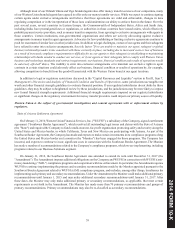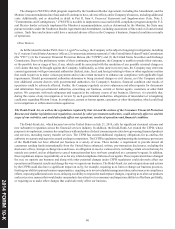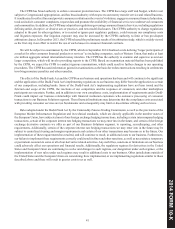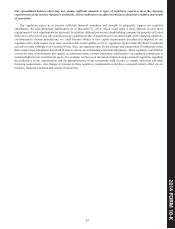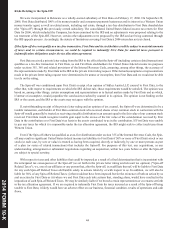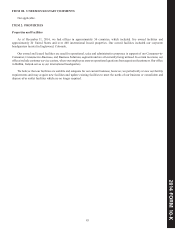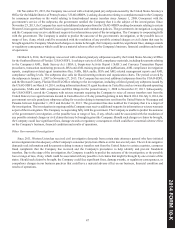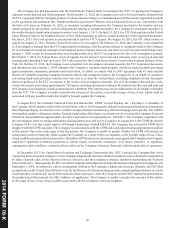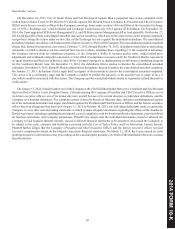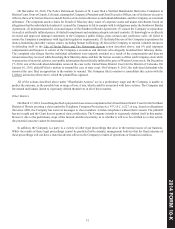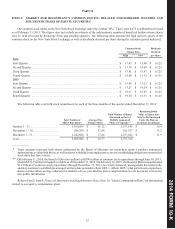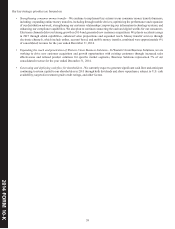Western Union 2014 Annual Report Download - page 186
Download and view the complete annual report
Please find page 186 of the 2014 Western Union annual report below. You can navigate through the pages in the report by either clicking on the pages listed below, or by using the keyword search tool below to find specific information within the annual report.
2014 FORM 10-K
48
The Company has had discussions with the United States Federal Trade Commission (the "FTC") regarding the Company's
consumer protection and anti-fraud programs. On December 12, 2012, the Company received a civil investigative demand from
the FTC requesting that the Company produce (i) all documents relating to communications with the monitor appointed pursuant
to the agreement and settlement (the "Southwest Border Agreement") Western Union Financial Services, Inc. entered into with
the State of Arizona on February 11, 2010, as amended, including information the Company provided to the monitor and any
reports prepared by the monitor; and (ii) all documents relating to complaints made to the Company by consumers anywhere in
the world relating to fraud-induced money transfers since January 1, 2011. On April 15, 2013, the FTC filed a petition in the United
States District Court for the Southern District of New York requesting an order to compel production of the requested documents.
On June 6, 2013, the Court granted in part and denied in part the FTC's request. On August 14, 2013, the FTC filed a notice of
appeal. On August 27, 2013, Western Union filed a notice of cross-appeal. On February 21, 2014, the Company received another
civil investigative demand from the FTC requesting the production of all documents relating to complaints made to the Company
by or on behalf of consumers relating to fraud-induced money transfers that were sent from or received in the United States since
January 1, 2004, except for documents that were already produced to the FTC in response to the first civil investigative demand.
On October 7, 2014, the United States Court of Appeals for the Second Circuit entered a summary order reversing in part and
vacating and remanding in part the June 6, 2013 order entered by the United States District Court for the Southern District of New
York. On October 22, 2014, the Company received another civil investigative demand issued by the FTC requesting documents
and information since January 1, 2004 relating to the Company’s consumer fraud program, its policies and procedures governing
agent termination, suspension, probation and reactivation, its efforts to comply with its 2005 agreement with 47 states and the
District of Columbia regarding consumer fraud prevention, and complaints made to the Company by or on behalf of consumers
concerning fraud-induced money transfers that were sent to or from the United States, excluding complaint-related documents
that were produced to the FTC in response to the earlier civil investigative demands. The civil investigative demand also seeks
various documents concerning approximately 720 agents, including documents relating to the transactions they sent and paid and
the Company’s investigations of and communications with them. The Company may receive additional civil investigative demands
from the FTC. The Company is unable to predict the outcome of this matter, or provide a range of loss, if any, which could be
associated with any possible claims that might be brought against the Company.
In August 2013, the Consumer Financial Protection Bureau (the “CFPB”) served Paymap, Inc. (“Paymap”), a subsidiary of
the Company which operates solely in the United States, with a civil investigative demand requesting information and documents
about Paymap’s Equity Accelerator service, which is designed to help consumers pay off their mortgages more quickly. The CFPB’s
investigation sought to determine whether Paymap’s marketing of the Equity Accelerator service violated the Consumer Financial
Protection Act’s prohibition against unfair, deceptive and abusive acts and practices (“UDAAP”). The Company cooperated with
the investigation. After reviewing information and documents provided by the Company, in August 2014, the CFPB advised the
Company of its view that certain aspects of Paymap’s marketing violated UDAAP. The Company has advised the CFPB that it
disagrees with the CFPB’s position. The Company is in discussions with the CFPB and is seeking to reach an appropriate resolution
of this matter. Due to the early stage of the discussions, the Company is unable to predict whether the CFPB will institute an
enforcement action to bring any claims against the Company as a result of the investigation, or the possible range of loss, if any,
which could be associated with such an action. Should the CFPB institute an enforcement action against the Company, the Company
could face significant restitution payments to certain Equity Accelerator consumers, civil money penalties, or regulatory
consequences that could have a material adverse effect on the Company’s business, financial condition and results of operations.
In December 2013, the United States Securities and Exchange Commission (the “SEC”) advised the Company that it was
conducting an investigation relating to (i) the Company’s digital and electronic channels and the revenues allocated to and reported
by those channels; and (ii) the Payment Services Directive and the Company’s strategic initiatives surrounding the Payment
Services Directive. Subsequently, the SEC served the Company with subpoenas seeking information relating to its investigation. On
September 3, 2014, in connection with its investigation relating to the Company’s digital and electronic channels, the SEC filed
an application in the United States District Court for the District of Colorado seeking an order compelling the production of certain
email and other electronically stored information for three employees. After the Company and the SEC reached an agreement on
the production of that material, the SEC withdrew its application. The Company is unable to predict the outcome of this matter,
or the range of loss, if any, which could be associated with the resolution of this investigation.



